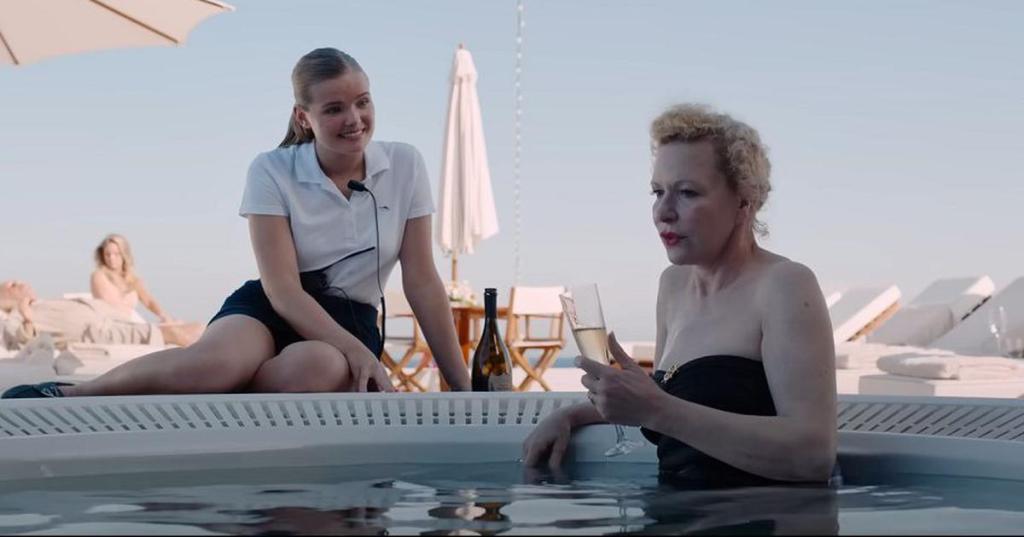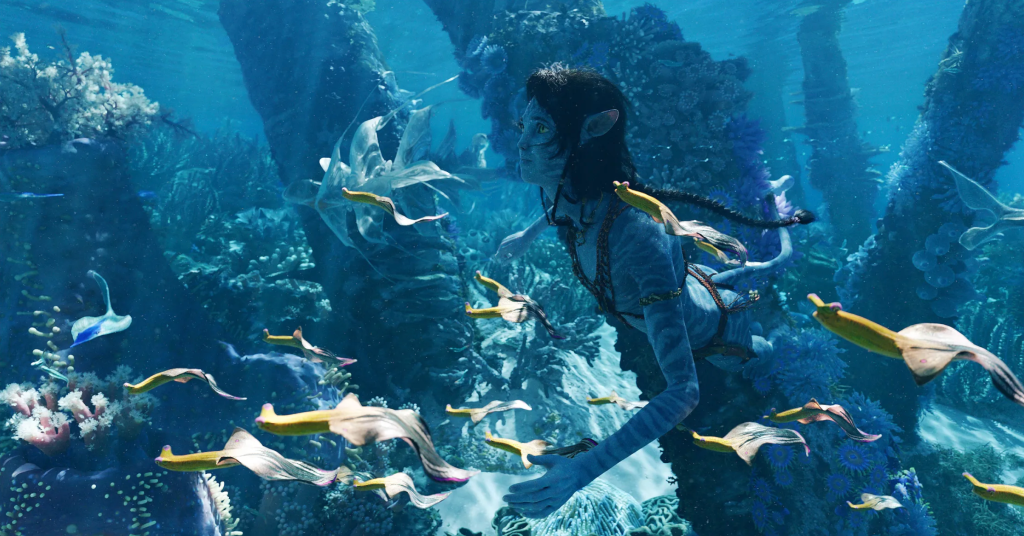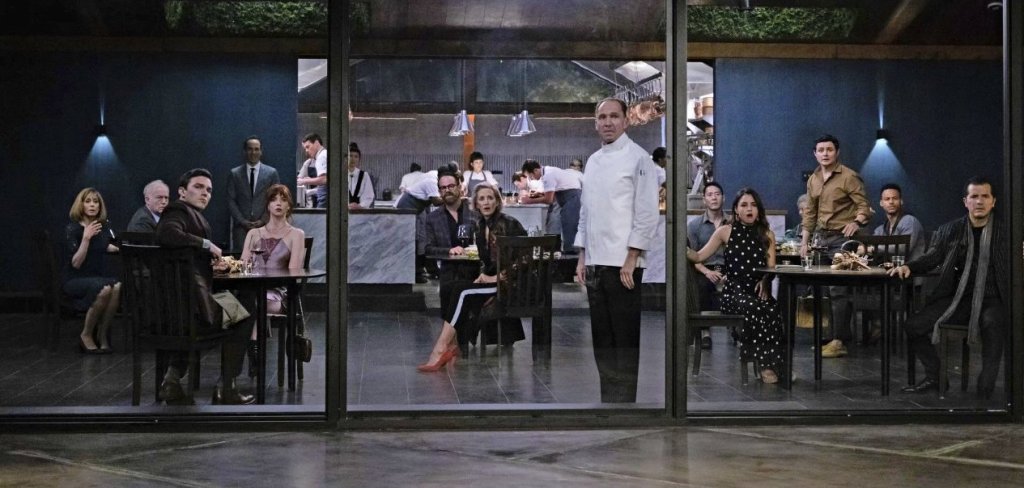The movies are finally back in theaters in a big way! While streaming services do continue to contribute some much-needed variety to the film ecosystem, I was able to catch a ton of my favorites in theaters in 2022. There have been a lot of big swings in film this year, some of which paid off, and others… not so much. More than most years, I feel there are even more diamonds in the the rough that I haven’t been able to catch yet. Here are my favorites of the 60 new films I saw in 2022.
Honorable Mentions
Triangle of Sadness
I’m a huge fan of Ruben Östlund and his deeply cynical sense of humor. I’m a major defender of The Square, a movie that was somewhat panned for being unfocused in its critiques. Unfortunately, Triangle of Sadness is my least favorite of Östlund’s films, and it’s mostly because… well it’s completely unfocused in its critiques. There’s a version of this movie that’s possibly my favorite of the year; it’s maybe 20-30 minutes shorter and exclusively centered on class divides.
That said, large chunks of this film are hilarious, and it contains some of my favorite moments of the year. It has some incredible sequences, and the textbook playing on human insecurities that Östlund is so known for. It’s a movie best enjoyed without knowing where it goes, so I won’t spoil it here. I’m glad it exists, and I hope people see it; I only wish Östlund would edit some of his ideas in the writing room in order to make his ultimate messages more compelling. (Neon / Hulu)
Bodies Bodies Bodies
A lot of people expressed a lot of love for Barbarian this year; while it was a movie I really liked, it lost a lot of steam for me once its secrets are revealed. Bodies Bodies Bodies, on the other hand, is a movie that grew and grew in my esteem as the film went on.
Bodies Bodies Bodies is the story of modern young friendships and how they can frequently be “friendships,” fraught with secret shit-talk and backstabbing. It’s a horror/thriller, sure, but it’s also hilarious in how it satires 2020s youth culture. Everyone is too self-absorbed to have genuine connections with their own friends, and as soon as the lights go out and the shit hits the fan, they’re so quick to turn on each other rather than banding together. To me, Bodies Bodies Bodies is a true masterclass in writing, and one of the first great “Gen Z” movies that I’ve seen. (A24)
Avatar: The Way of Water
We get our first James Cameron movie in 13 years, and so many people were quick to brush it off just because it’s a sequel to his previous ground-breaking film. The Avatar series is not the most complex original story in existence – ultimately similar stories have been told before. But what it does better than any other is innovate on action storytelling and spectacle in a way that’s never been done before. Cameron is literally the best in the business when it comes to action set-pieces, so much so that he makes it look effortless. But stack it against literally any of the 31 Marvel films, and there is simply no comparison in how much stronger the story is told through action in Avatar: The Way of Water. I’m so glad that this movie is as successful as it is, because I hope that James Cameron gets to make as many of these as he wants. Big Jim forever. (20th Century)
Top Ten
10. The Menu
There were few movie-going experiences this year that I found more entertaining than The Menu. My partner and I both had a blast at this movie. On the surface, it’s a thriller with content that should be highly disturbing. But more than anything, I found it very darkly comedic throughout its runtime. Because almost all of its characters are detestable (and several of the victims very two-dimensional), the audience feels free to accept their demise as inevitable (in a “Final Destination” sort of way). This leaves you free to just laugh at the absurdity of the situation.
I found the message of The Menu to be less about class divides (though there is a bit of that), and more about the nature of people and the dividing line between the “creators” and the “consumers.” While the film has harsh things to say about the “consumers” in particular, I think ultimately it judges both ends of the spectrum to be guilty of being a blight on the larger ecosystem. There are perhaps some films that tackle similar issues with a bit more “bite,” but what can I say – sometimes you just want a really filling, well-made burger. (Searchlight / HBO Max)
9. Marcel the Shell with Shoes On
Based on a cute internet short of the same name, Marcel the Shell with Shoes On seems like it would be a light, fluffy family film without much meat on the bone. While it is indeed light and fluffy, hidden within is a rather melancholy story about isolation, grief, and a need for community. Marcel is mostly happy in his life, but unwilling to branch out from the life he knows for fear of losing what he and his grandmother already have. Meanwhile, his grandmother can sense a deep loneliness in Marcel, and selflessly wants him to “break out of his shell” as it were and pursue a greater family, no matter the risk. I’ve heard Marcel described as a children’s film, and while children certainly could enjoy it, its themes are very adult, and particularly resonant coming out of lockdown from the Covid-19 pandemic. (A24 / Paramount+)
8. Armageddon Time
We’ve seen a ton of “director revisits their childhood” movies in the past few years: Kenneth Brannagh with Belfast, Sam Mendes with Empire of Light, and Steven Spielberg with The Fabelmans (the last of which could easily be on my list). For my money, my favorite of these is perhaps the least romanticized of the bunch: James Gray’s Armageddon Time.
Gray’s stand-in is Paul Graff (Banks Repeta), a Jewish sixth-grader growing up in 1980 Queens. As he comes of age, he’s constantly being torn between figuring out who he is and what it means to become a mensch from his grandfather (a fantastic performance by Sir Anthony Hopkins). But what Armageddon Time is really about how the same person can both have privilege and also be oppressed, depending on the circumstances. It’s about the moral obligation to use that privilege to help those less fortunate, and how sometimes you can fall short, and the guilt that comes with that. The world isn’t fair, and some injustices seem impossible to fix, but that doesn’t mean you should stop trying to do what you can to make it better. (Universal / Peacock)
7. Decision to Leave
Park Chan-wook is perhaps my favorite filmmaker working today. Even his “genre” movies, like his romantic noir thriller Decision to Leave, have brilliant craftsmanship and themes. He is able to create images with the camera that no one else has considered before, and every frame is something new to discover. Like many Chan-wook movies, Decision to Leave features an unconventional romance at its center, with Tang Wei and Park Hae-il giving two lead performances with the wonderful chemistry and mystery that this Hitchcockian story demands. (Mubi)
6. Babylon
Babylon rules. I understand why a lot of people didn’t connect with it – it’s really long, it’s overly indulgent, it’s loud and bombastic and frequently crass. All true, but this film also has one of the most exciting depictions of the silent film era in cinema, and some of the absolute best set-pieces of the year. In particular, the sequence showing the shared silent film filming location and the one with a “first day of talkie shoots” are simply incredible, and alone are worth the price of admission. And the movie perfectly deploys Margot Robbie, whose talents are frankly taken for granted by the filmgoing community in 2022.
Maybe my hottest take about Babylon is that this three hour and ten minute movie is actually too short for the conclusion it’s trying to earn. Ultimately Babylon is trying to have a “have its cake and eat it too” moment similar to La La Land (a movie it’s in direct conversation with). In my mind, what it’s saying is basically “sure Hollywood will chew people up and spit them out, but look what magic it can create.” To really get there in each of its main characters’ stories would require even more screen time than it already has. Unfortunately, the energy that Babylon starts with can’t be sustained for its full runtime, and its second half is going to be a disappointment no matter what. But hey, that first hour and a half are some of the best cinema of the year, and that’s the portion that has really stuck with me. (Paramount+)
5. Tár
You cannot start without her. Tár pulls off an incredible balancing act. Lydia Tár (a phenominal performance by Cate Blanchett) is in every scene, the story told almost entirely from her perspective. And yet, from the opening sequences, the audience is made to dislike her and recognize her narcissism and hypocrisy. Somehow the movie is able to keep us with her for its two-hour 39-minute runtime, watching as she damages lives around her, waiting to see if she gets her comeupance. Lydia is so caught up in her narcissism that she does not even bother to consider whether she is in the right, other than her occassional moments of paranoia and panic that indicates some sliver of guilt.
Among other things, Tár reminds me of academia: the power dynamics, the false humility, the stroking of egos, the callousness with which someone might be thrown under the bus. While the artist makes decisions that eventually result in great art, what typically goes unseen are the motivations behind the decisions that go into that art. Ultimately above all things, Tár is about power and ego, and how if those go completely unchecked (and indeed, constantly fed), corruption will inevitably follow. Whether the corruption is eventually met with accountability… well, that depends on how close Icarus flies to the sun. (Focus / Peacock)
4. Guillermo Del Toro’s Pinocchio
I’ve admirred Guillermo Del Toro’s work, but none of them has really “hit” with me this decade (though last year’s Nightmare Alley did come close). I believe that right beside Pan’s Labyrinth, Pinocchio is Del Toro’s masterpiece.
I’ve never seen a stop-motion film quite like this one. The attention to detail in the miniature world constructed is astounding. Each of its sets looks as though they were plucked directly from 1930s Italy. The cinematography is some of the best of the year, shots composed for live-action rather than animation. And of course, Del Toro never passes an opportunity for brilliant creature design, and a surreal fantasy world to explain the rules of Pinocchio’s immortality.
But the film is more than just a technical showpiece. Del Toro chooses to set the known and beloved story of Pinocchio against the backdrop of fascism, a decision that feels quite at home with the story’s dark roots. Pinocchio as a character is an innocent, easily manipulated to nefarious ends. He needs the guidance of family. In the end, Pinocchio finally finds that family, and learns the value in life and mortality, sharing what time he has with the ones he loves. (Netflix)
3. Aftersun
Aftersun is a really special film. Told largely through home video footage from the early 2000s, it’s a story of a woman (Sophie, played in a breakout performance by Frankie Corio) looking back at a holiday with her dad to better understand her relationship to her father. The audience is left in the dark as to the context of her search, and must fill in the pieces for themselves as to what they are watching. Part of the magic is in Paul Mescal’s performance as a young father (Calum) who clearly loves his daughter very deeply, and yet is struggling with his own personal demons. Like Sophie, the audience is forced to analyze every shot, DV footage or otherwise, to gain insight into Calum’s internal life.
Charlotte Wells is the discovery of the year in my opinion. I had assumed that Aftersun was a deeply personal story, inspired by a moment of childhood. After listening to an interview with Wells, it’s clear that this isn’t a film she’s been wanting to make her whole life. The movie started as a much more conventional coming-of-age story, which I’m sure would have been good but somewhat forgettable. Instead, through pure instincts, she transformed the film into something unique and magical.
Wells has an incredible confidence in her directing instincts, especially as a first-time filmmaker. She frequently chooses to put the camera at a distance to the subjects, or pointed in an odd direction such that the subjects are just out of frame. In the hands of a lesser director, the film may have been shot much more conventionally, or worse, these choices might not work and the audience may lose interest. Instead, the shot compositions lead to exactly their intended effect: the strengthening of themes of memory, an almost dream-like take on an experience barely remembered.
Aftersun will not work for everyone, but if you give yourself over to it, it is a sometimes beautiful, sometimes heart-wrenching tale of the love between a father and a daughter, and what obstacles that love can (and cannot) overcome. (A24)
2. White Noise
Of the many great films of 2022 I’ve seen, White Noise is the one I find the most under-appreciated. This movie is an absurdist comedy that is a hilarious look at existential dread and how people react to it.
There are so many things that White Noise deftly parodies. It’s a hilarious send-up of academia, culminating in a “lecture-battle” between Adam Driver’s pontificating about Hitler against Don Cheadle’s similarly vapid take on Elvis. Its second act provides an extremely potent take on mass panic as people try to protect their family in the face of a disaster, as seen in real life during the early stages of the Covid-19 pandemic. Its third act approaches the existential dread about death more directly, finally forcing its characters to cut through the superficial nonsense and come to terms with very real problems. And it culminates in one of the best ending sequences I’ve ever seen.
The characters in White Noise are constantly talking past each other, babbling nonsense that sounds intelligent but is ultimately just parroting the same surface-level lines that everyone else is. This “white noise” is all to distract the characters from the existential dread of meaningless lives and the inevitability of death. Even when they talk about philosophical topics (like death), it’s always in the most superficial way possible. However, occasionally the dread can’t be kept at bay – in the middle of the night, for instance, or once Driver learns his exposure to the Airbourne Toxic Event will impact his health. In those moments, the tone abruptly shifts from absurdist comedy to moments of horror. These sharp tonal shifts are what turn many people off to the film, but I personally find it crucial to what it ultimately has to say.
White Noise is one of the most misunderstood movies of the year, and it’s one that I hope more people have a chance to catch up with. Noah Baumbach continues to make complex and entertaining films, and this “impossible” adaptation is no exception. (Netflix)
1. Everything Everywhere All at Once
How Everything Everywhere All at Once went from “outrageously original indie sci-fi film of the year” to “awards juggernaut” is beyond me. What can I say? Sometimes the Academy gets it right.
Everything Everywhere is a miracle of a film. It’s incredible how a movie can be so exciting, innovative, and visually-engaging, while having an incredible sense of humor. The real secret sauce, though, is that at its core, it has a real heart. A story about the infinite choices we make throughout life, and the value to be found in living an “ordinary” life. And on top of that, it’s about resisting the pull of nihilism as well, and the value of being decent to the people in our lives in an objectively unfeeling universe.
In many ways, this script feels like a student film. It’s the kind of high-concept premise that someone might come up with in film school after seeing The Matrix for the first time. In different hands, it would be a creative but ultimately flawed first feature, a promising indication of what a filmmaker was capable of if given experience and a real budget. But here’s the thing: this movie does have a real budget, and it has two masterful filmmakers at the helm in the Daniels.
After seeing Swiss Army Man, I knew the Daniels were a special directing pair. But I never imagined they’d make something so unique as their second feature. They make their $25 million budget look three times that, and show that their story-telling instincts are phenomenal. I don’t know how they follow this one up, or if they can reach these heights again, but in 2022 they made something special, and I’m so glad the movie is getting the attention it deserves. (A24 / Paramount+)
That’s 2022! As awards season (finally) wraps up, it’s nice to look ahead to what 2023 holds. I’m hoping we continue to see a return to cinema for smaller films in addition to the large, and that studios can find a successful distribution model for their smaller, “more adult” fair like Tár and Aftersun. On to 2023!













